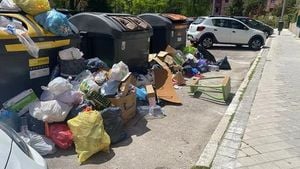On April 27, 2025, Mexican President Claudia Sheinbaum made headlines during her visit to Yucatán, where she addressed the International Monetary Fund's (IMF) recent pessimistic economic forecasts for Mexico. The IMF projected a contraction of 0.3% in economic activity for this year and warned that the country's debt could reach 60.7% of its GDP. Responding to these forecasts, Sheinbaum asserted, "That is their vision; they have not understood that the Fourth Transformation has arrived in Mexico, and corruption and privileges have ended. The resources of the people are returned to the people." This statement came as she inaugurated the cargo section of the controversial Tren Maya project in Progreso.
The IMF's downgrade of Mexico's growth prospects was significant, marking the steepest reduction among major global economies. Specifically, the organization cut its growth forecast by 1.7 percentage points, predicting a GDP contraction of 0.3% for 2025 and a further decrease of 0.6% in 2026. The IMF cited several factors influencing this downturn, including tariffs imposed by the United States, geopolitical tensions, and tightening financial conditions. As Sheinbaum highlighted, "In our relationship with the United States, Mexico is not anyone's piñata. They should focus on their own country, as they have enough problems to deal with," referencing the ongoing issues of drug addiction and political strife in the U.S.
During her weekend speeches, Sheinbaum adopted a more combative tone, particularly regarding U.S. immigration policies and the rhetoric surrounding Mexico in American electoral campaigns. "They should not use Mexico for their campaigns, because Mexico teaches the United States many lessons in various aspects, including values, ethics, and development," she stated emphatically.
While Sheinbaum's nationalistic rhetoric resonates with many Mexicans, particularly in light of the tariffs currently affecting the country—25% on steel and aluminum and a similar rate on various exports to the U.S. outside of the United States-Mexico-Canada Agreement (USMCA)—the economic implications remain concerning. The ongoing trade war with the U.S. continues to loom large over Mexico's economic landscape, with the potential for tariffs to expand to other products like tomatoes and avocados, creating daily uncertainty for Mexican exporters.
In addition to addressing economic concerns, Sheinbaum also reflected on her past discussions with former President Donald Trump regarding drug abuse in both nations. In a recent speech, she recounted a conversation where Trump asked her, "Do drugs get consumed in Mexico?" She responded, "Yes, we have a problem with addictions, but not to the extent that the United States does." She attributed the lesser severity of addiction issues in Mexico to strong family values, stating, "Mexican families have many values; we take care of each other and protect one another."
These discussions are particularly timely as the U.S. prepares for a series of elections in 2026, with many politicians likely to leverage immigration and drug-related issues in their campaigns. Sheinbaum's remarks seem aimed at both domestic and international audiences, reinforcing her administration's commitment to sovereignty and dignity while also addressing the complexities of U.S.-Mexico relations.
While Sheinbaum's public stance is one of resilience and national pride, the underlying economic challenges are palpable. She announced a plan to boost domestic production and reduce reliance on imports, particularly in the agricultural and industrial sectors. This initiative includes a focus on self-sufficiency in milk production, among other areas, as she seeks to bolster Mexico's economy against external pressures.
As she spoke in Yucatán, Sheinbaum also took a moment to celebrate Mexico's rich cultural heritage, emphasizing the contributions of ancient civilizations such as the Maya and Olmecs. "Mexico is a unique and extraordinary country, and there are very few nations that can boast of indigenous cultures to the world," she remarked, reflecting on the historical significance of these cultures in shaping contemporary Mexican identity.
She concluded her address by urging Mexicans to take pride in their heritage and the progress made during her administration, stating, "Today, more than ever, the people of Mexico, through the Fourth Transformation, have regained their dignity and strength, and no one can take that away from them." This message resonated with the crowd gathered in Campeche, where Sheinbaum also launched the "Housing for Well-Being" program, marking the beginning of new housing projects in the state.
As Sheinbaum navigates the complex dynamics of international relations, economic forecasts, and domestic challenges, her administration's approach will be closely watched. The coming months will be critical as Mexico faces both external pressures from the U.S. and internal demands for economic stability and social progress.




